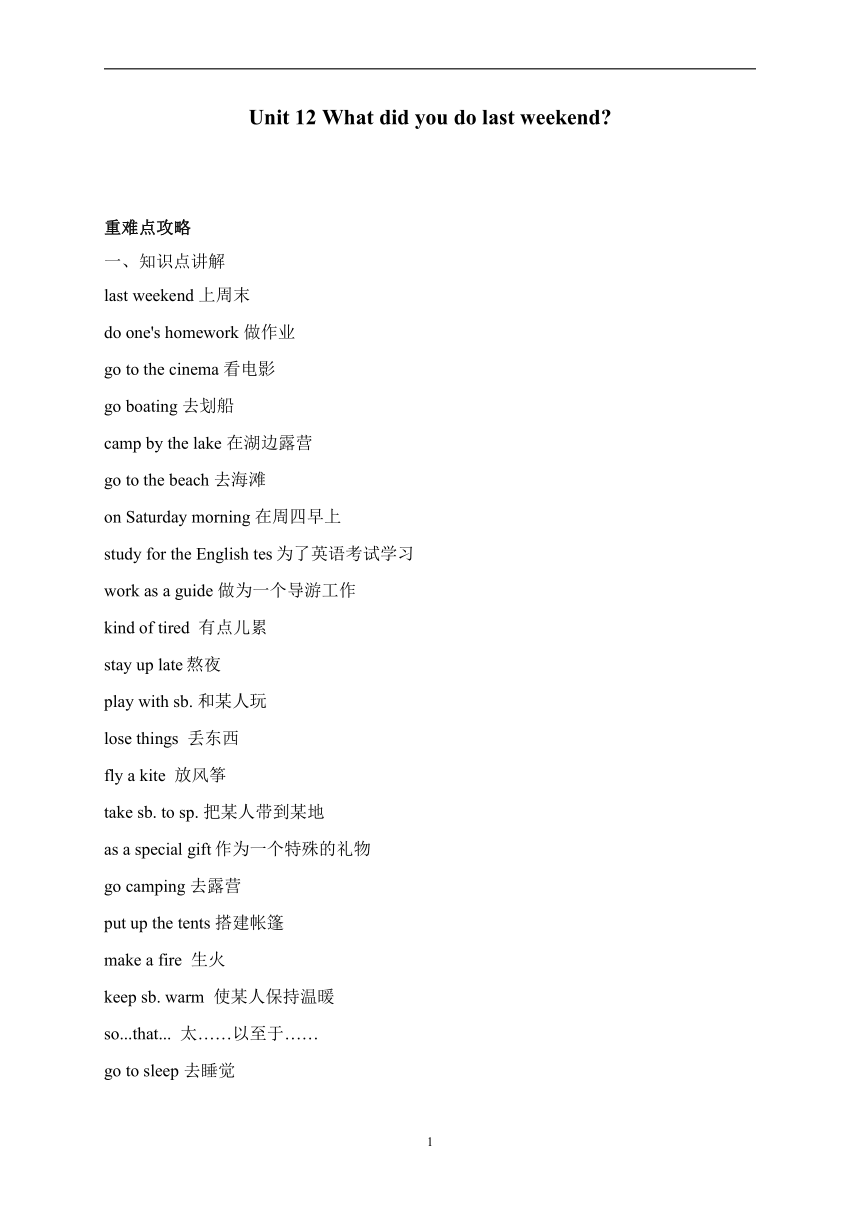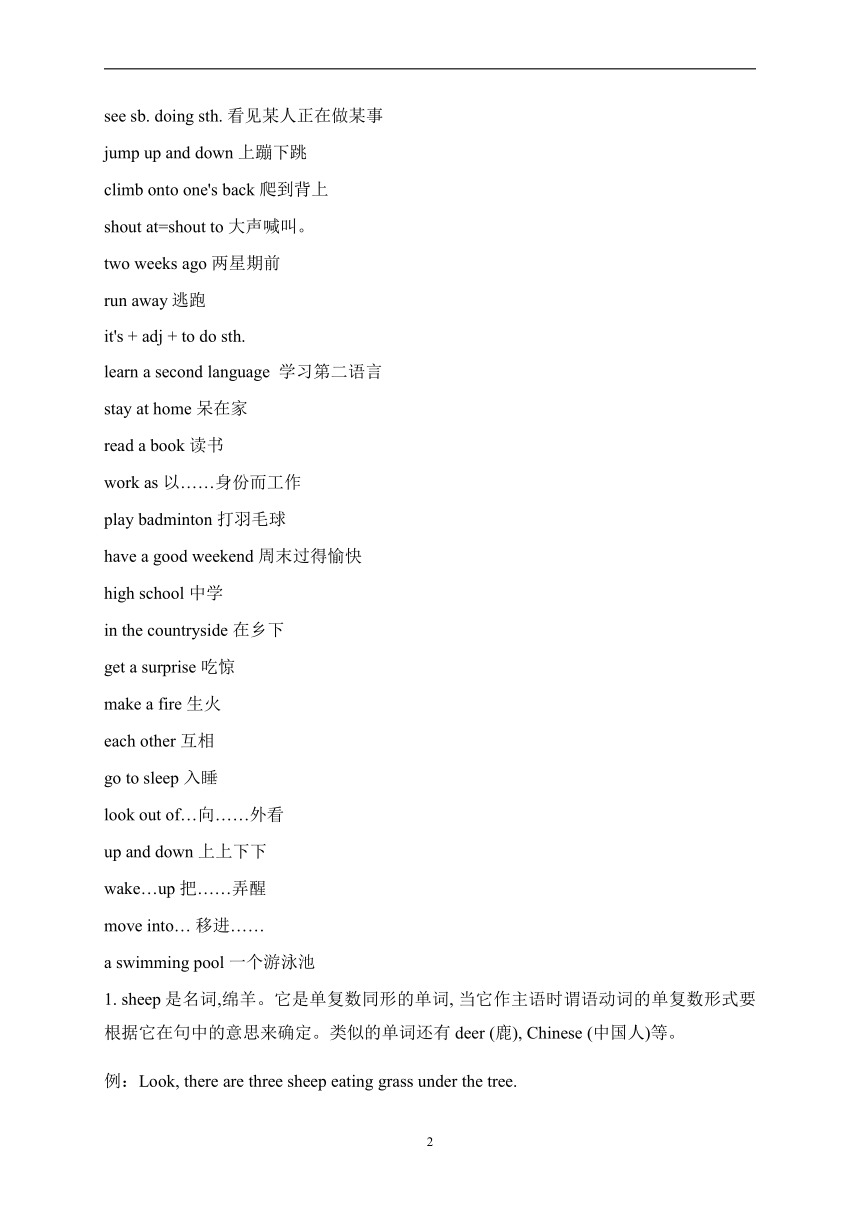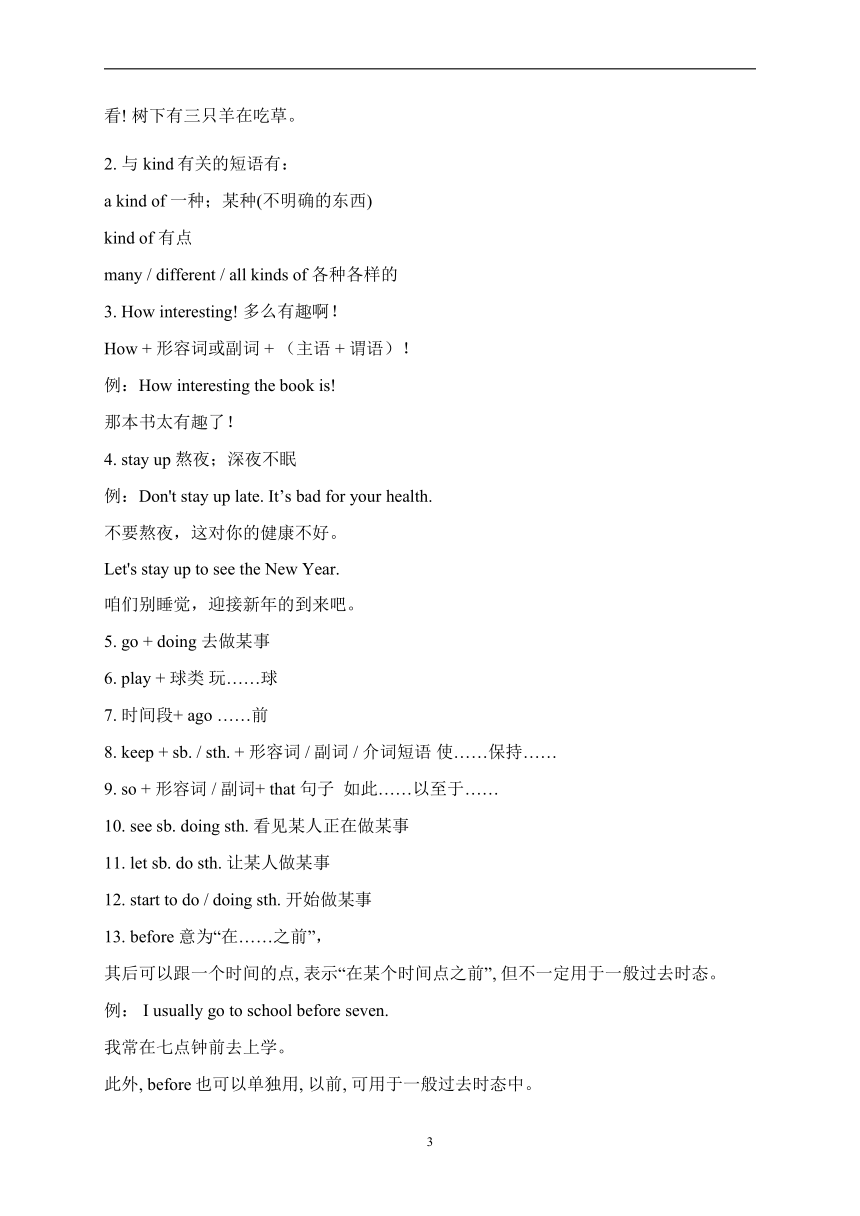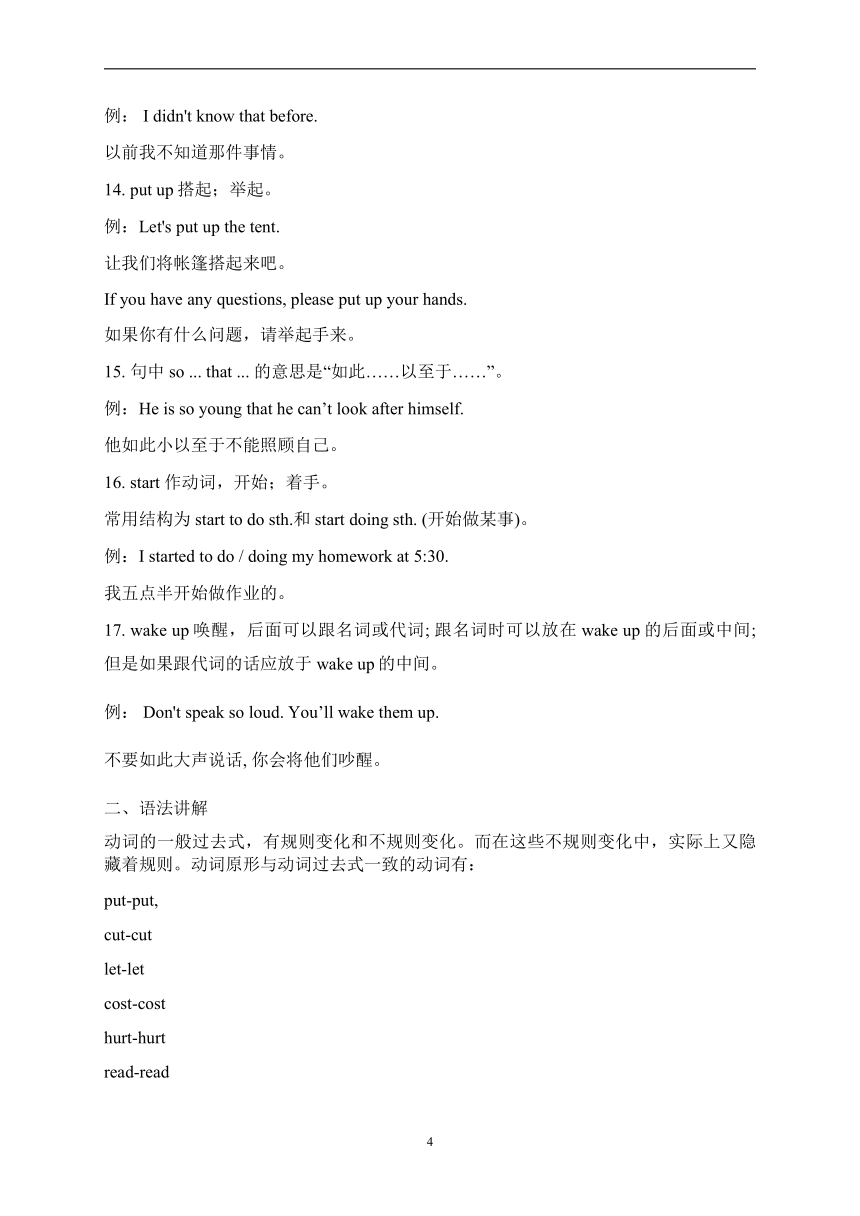Unit 12 What did you do last weekend?2022-2023学年人教版英语七年级下学期期末复习练习(含解析)
文档属性
| 名称 | Unit 12 What did you do last weekend?2022-2023学年人教版英语七年级下学期期末复习练习(含解析) |  | |
| 格式 | docx | ||
| 文件大小 | 27.2KB | ||
| 资源类型 | 教案 | ||
| 版本资源 | 人教新目标(Go for it)版 | ||
| 科目 | 英语 | ||
| 更新时间 | 2023-06-18 15:21:54 | ||
图片预览




文档简介
Unit 12 What did you do last weekend
重难点攻略
一、知识点讲解
last weekend 上周末
do one's homework 做作业
go to the cinema 看电影
go boating 去划船
camp by the lake 在湖边露营
go to the beach 去海滩
on Saturday morning 在周四早上
study for the English tes为了英语考试学习
work as a guide 做为一个导游工作
kind of tired 有点儿累
stay up late熬夜
play with sb. 和某人玩
lose things 丢东西
fly a kite 放风筝
take sb. to sp. 把某人带到某地
as a special gift作为一个特殊的礼物
go camping 去露营
put up the tents 搭建帐篷
make a fire 生火
keep sb. warm 使某人保持温暖
so...that... 太……以至于……
go to sleep 去睡觉
see sb. doing sth. 看见某人正在做某事
jump up and down 上蹦下跳
climb onto one's back 爬到背上
shout at=shout to 大声喊叫。
two weeks ago 两星期前
run away逃跑
it's + adj + to do sth.
learn a second language 学习第二语言
stay at home 呆在家
read a book 读书
work as 以……身份而工作
play badminton 打羽毛球
have a good weekend 周末过得愉快
high school 中学
in the countryside 在乡下
get a surprise 吃惊
make a fire 生火
each other 互相
go to sleep 入睡
look out of…向……外看
up and down 上上下下
wake…up 把……弄醒
move into… 移进……
a swimming pool 一个游泳池
1. sheep是名词,绵羊。它是单复数同形的单词, 当它作主语时谓语动词的单复数形式要根据它在句中的意思来确定。类似的单词还有deer (鹿), Chinese (中国人)等。
例:Look, there are three sheep eating grass under the tree.
看! 树下有三只羊在吃草。
2. 与kind有关的短语有:
a kind of 一种;某种(不明确的东西)
kind of 有点
many / different / all kinds of 各种各样的
3. How interesting! 多么有趣啊!
How + 形容词或副词 + (主语 + 谓语)!
例:How interesting the book is!
那本书太有趣了!
4. stay up 熬夜;深夜不眠
例:Don't stay up late. It’s bad for your health.
不要熬夜,这对你的健康不好。
Let's stay up to see the New Year.
咱们别睡觉,迎接新年的到来吧。
5. go + doing 去做某事
6. play + 球类 玩……球
7. 时间段+ ago ……前
8. keep + sb. / sth. + 形容词 / 副词 / 介词短语 使……保持……
9. so + 形容词 / 副词+ that 句子 如此……以至于……
10. see sb. doing sth. 看见某人正在做某事
11. let sb. do sth. 让某人做某事
12. start to do / doing sth. 开始做某事
13. before 意为“在……之前”,
其后可以跟一个时间的点, 表示“在某个时间点之前”, 但不一定用于一般过去时态。
例: I usually go to school before seven.
我常在七点钟前去上学。
此外, before也可以单独用, 以前, 可用于一般过去时态中。
例: I didn't know that before.
以前我不知道那件事情。
14. put up搭起;举起。
例:Let's put up the tent.
让我们将帐篷搭起来吧。
If you have any questions, please put up your hands.
如果你有什么问题,请举起手来。
15. 句中so ... that ... 的意思是“如此……以至于……”。
例:He is so young that he can’t look after himself.
他如此小以至于不能照顾自己。
16. start 作动词,开始;着手。
常用结构为start to do sth.和start doing sth. (开始做某事)。
例:I started to do / doing my homework at 5:30.
我五点半开始做作业的。
17. wake up唤醒,后面可以跟名词或代词; 跟名词时可以放在wake up的后面或中间; 但是如果跟代词的话应放于 wake up的中间。
例: Don't speak so loud. You’ll wake them up.
不要如此大声说话, 你会将他们吵醒。
二、语法讲解
动词的一般过去式,有规则变化和不规则变化。而在这些不规则变化中,实际上又隐藏着规则。动词原形与动词过去式一致的动词有:
put-put,
cut-cut
let-let
cost-cost
hurt-hurt
read-read
beat-beat
(注意:read写法相同,读音不同。其它写法和读音都相同。)
2. 动词过去式不规则变化:
(1)i-a:
sing-sang
ring-rang
swim-swam
drink-drank
begin-began
(2)~ew:
fly-flew
draw-drew
grow-grew
know-knew
throw-threw
(3)d-t:
build-built
send-sent
~ught:
buy-bought
bring-brought
备考满分练
一、单选题
1.I saw her _____ flowers in the garden when I passed by.
A. to water B. water C. watering D. watered
2.—Where did you go last weekend
—I _____ to the Great Wall.
A. go B. went C. will go D. have gone
3.We are going to have a party _____ the evening of June 30th.
A.on B.in C.at D.for
4.—Do you know who took the students to the old people's home, Tony
—Well, Mr Smith _____.
A.took B.does C.did D.do
5.Last week Vivian ______ a dress for her mother with her first-month salary.
A. buy B. bought C. will buy D. buys
6.Our teacher ____ a bookshelf at the back of our classroom to make a small reading comer.
A.picked up B.put up C.took up D.got up
7.A true friend will never ____ from you when you're in trouble.
A.take away B.run away C.take off D.get off
8.—Do you know who took the students to the old people's home,Tony
—Well, Mr. Smith ____ .
A.took B.does C.did D.do
9.Zhang ling didn't tell her parents that she was going home because she wanted to give them a(n)____.
A.surprise B. call C. gift D. answer
10.—_____ sweet the flowers smell in spring!
—Yes, many tourists come to enjoy them every day.
A. What B. How C. What a D. How a
二、填空题
11.An elephant has two big__________(耳朵).
12.My grandpa made a__________(风筝) for me with bamboo and paper.
13.There is a small__________(森林) in the east of my village. We often play in it.
14.When the policeman saw a boy fall into the water, he__________(跳) into the river quickly.
15.Chinese is a useful__________(语言). So we must try to learn it well.
三、句型转换
16.He did his homework after school yesterday.(改为一般疑问句)
_____ he _____ his homework after school yesterday
17.She helped her mother cook yesterday.(改为否定句)
She_____ _____her mother cook yesterday.
18.We went camping with our teacher.(对画线部分提问)
_____ _____ _____ _____ camping with
19.I went to America last weekend. (对画线部分提问)
_____ _____ you _____ last weekend
20.Tom's mother woke him up about one hour ago. (改为否定句)
Tom's mother _____ _____ him up about one hour ago.
答案以及解析
一、单选题
1.答案:C
解析:考查非谓语动词。句意: 我路过时看见她正在花园里浇花。see sb. doing sth.看见某人正在做某事, 符合句意。故选C。
2.答案:B
解析:句意:——你上周末去哪儿了 ——我去长城了。由last weekend可知,此处用一般过去时表达。故选B。
3.答案:A
解析:考查介词的用法。句意: 我们将在6月30日晚上举行一个聚会。on后接具体某一天或某一天的上午, 下午, 晚上; in后接某个月, 某年或泛指的早上, 下午, 晚上; at后接钟点; for后接一段时间。空格后表达"在6月30日晚上"。故选A。
4.答案:C
解析:英语中为了避免不必要的重复, 经常用do, does, did, so来代替前面的动词或相关内容, 叙述过去发生的事, 应用一般过去时。故选C。
5.答案:B
解析:B根据时间状语Last week可知,应用一般过去时。故选B。
6.答案:B
解析:句意:我们老师在教室后面搭起了一个书架,作为一个小读书角。 pick up"捡起,学会";put up"举起,搭起"; take up"占用"; get up"起床"。故选B。
7.答案:B
解析:句意:真正的朋友从不会在你处于困境的时候远离你。run away from意为"逃离,远离",符合题意。故选B。
8.答案:C
解析:英语中为了避免不必要的重复,经常用do,does,did,so来代替前面的动词或相关内容。叙述过去发生的事,应用一般过去时。故选C。
9.答案:A
解析:句意:张玲没有告诉她的父母她打算回家,因为她想给他们一个惊喜。 surprise"惊喜";call "电话";gift "礼物"; answer "答复"。根据句意可知,玛丽想给父母一个惊喜。故选A。
10.答案:B
解析:感叹句结构包括:“How+形容词/副词+主语+谓语!”和“What(a/an)+形容词+名词+主语+谓语!”。sweet是形容词。故选B。
二、填空题
11.答案:ears
12.答案:kite
13.答案:forest
14.答案:jumped
15.答案:language
三、句型转换
16.答案:Did; do
17.答案:didn’t help
18.答案:Who did you go
19.答案:Where did; go
20.答案:didn't wake
2
重难点攻略
一、知识点讲解
last weekend 上周末
do one's homework 做作业
go to the cinema 看电影
go boating 去划船
camp by the lake 在湖边露营
go to the beach 去海滩
on Saturday morning 在周四早上
study for the English tes为了英语考试学习
work as a guide 做为一个导游工作
kind of tired 有点儿累
stay up late熬夜
play with sb. 和某人玩
lose things 丢东西
fly a kite 放风筝
take sb. to sp. 把某人带到某地
as a special gift作为一个特殊的礼物
go camping 去露营
put up the tents 搭建帐篷
make a fire 生火
keep sb. warm 使某人保持温暖
so...that... 太……以至于……
go to sleep 去睡觉
see sb. doing sth. 看见某人正在做某事
jump up and down 上蹦下跳
climb onto one's back 爬到背上
shout at=shout to 大声喊叫。
two weeks ago 两星期前
run away逃跑
it's + adj + to do sth.
learn a second language 学习第二语言
stay at home 呆在家
read a book 读书
work as 以……身份而工作
play badminton 打羽毛球
have a good weekend 周末过得愉快
high school 中学
in the countryside 在乡下
get a surprise 吃惊
make a fire 生火
each other 互相
go to sleep 入睡
look out of…向……外看
up and down 上上下下
wake…up 把……弄醒
move into… 移进……
a swimming pool 一个游泳池
1. sheep是名词,绵羊。它是单复数同形的单词, 当它作主语时谓语动词的单复数形式要根据它在句中的意思来确定。类似的单词还有deer (鹿), Chinese (中国人)等。
例:Look, there are three sheep eating grass under the tree.
看! 树下有三只羊在吃草。
2. 与kind有关的短语有:
a kind of 一种;某种(不明确的东西)
kind of 有点
many / different / all kinds of 各种各样的
3. How interesting! 多么有趣啊!
How + 形容词或副词 + (主语 + 谓语)!
例:How interesting the book is!
那本书太有趣了!
4. stay up 熬夜;深夜不眠
例:Don't stay up late. It’s bad for your health.
不要熬夜,这对你的健康不好。
Let's stay up to see the New Year.
咱们别睡觉,迎接新年的到来吧。
5. go + doing 去做某事
6. play + 球类 玩……球
7. 时间段+ ago ……前
8. keep + sb. / sth. + 形容词 / 副词 / 介词短语 使……保持……
9. so + 形容词 / 副词+ that 句子 如此……以至于……
10. see sb. doing sth. 看见某人正在做某事
11. let sb. do sth. 让某人做某事
12. start to do / doing sth. 开始做某事
13. before 意为“在……之前”,
其后可以跟一个时间的点, 表示“在某个时间点之前”, 但不一定用于一般过去时态。
例: I usually go to school before seven.
我常在七点钟前去上学。
此外, before也可以单独用, 以前, 可用于一般过去时态中。
例: I didn't know that before.
以前我不知道那件事情。
14. put up搭起;举起。
例:Let's put up the tent.
让我们将帐篷搭起来吧。
If you have any questions, please put up your hands.
如果你有什么问题,请举起手来。
15. 句中so ... that ... 的意思是“如此……以至于……”。
例:He is so young that he can’t look after himself.
他如此小以至于不能照顾自己。
16. start 作动词,开始;着手。
常用结构为start to do sth.和start doing sth. (开始做某事)。
例:I started to do / doing my homework at 5:30.
我五点半开始做作业的。
17. wake up唤醒,后面可以跟名词或代词; 跟名词时可以放在wake up的后面或中间; 但是如果跟代词的话应放于 wake up的中间。
例: Don't speak so loud. You’ll wake them up.
不要如此大声说话, 你会将他们吵醒。
二、语法讲解
动词的一般过去式,有规则变化和不规则变化。而在这些不规则变化中,实际上又隐藏着规则。动词原形与动词过去式一致的动词有:
put-put,
cut-cut
let-let
cost-cost
hurt-hurt
read-read
beat-beat
(注意:read写法相同,读音不同。其它写法和读音都相同。)
2. 动词过去式不规则变化:
(1)i-a:
sing-sang
ring-rang
swim-swam
drink-drank
begin-began
(2)~ew:
fly-flew
draw-drew
grow-grew
know-knew
throw-threw
(3)d-t:
build-built
send-sent
~ught:
buy-bought
bring-brought
备考满分练
一、单选题
1.I saw her _____ flowers in the garden when I passed by.
A. to water B. water C. watering D. watered
2.—Where did you go last weekend
—I _____ to the Great Wall.
A. go B. went C. will go D. have gone
3.We are going to have a party _____ the evening of June 30th.
A.on B.in C.at D.for
4.—Do you know who took the students to the old people's home, Tony
—Well, Mr Smith _____.
A.took B.does C.did D.do
5.Last week Vivian ______ a dress for her mother with her first-month salary.
A. buy B. bought C. will buy D. buys
6.Our teacher ____ a bookshelf at the back of our classroom to make a small reading comer.
A.picked up B.put up C.took up D.got up
7.A true friend will never ____ from you when you're in trouble.
A.take away B.run away C.take off D.get off
8.—Do you know who took the students to the old people's home,Tony
—Well, Mr. Smith ____ .
A.took B.does C.did D.do
9.Zhang ling didn't tell her parents that she was going home because she wanted to give them a(n)____.
A.surprise B. call C. gift D. answer
10.—_____ sweet the flowers smell in spring!
—Yes, many tourists come to enjoy them every day.
A. What B. How C. What a D. How a
二、填空题
11.An elephant has two big__________(耳朵).
12.My grandpa made a__________(风筝) for me with bamboo and paper.
13.There is a small__________(森林) in the east of my village. We often play in it.
14.When the policeman saw a boy fall into the water, he__________(跳) into the river quickly.
15.Chinese is a useful__________(语言). So we must try to learn it well.
三、句型转换
16.He did his homework after school yesterday.(改为一般疑问句)
_____ he _____ his homework after school yesterday
17.She helped her mother cook yesterday.(改为否定句)
She_____ _____her mother cook yesterday.
18.We went camping with our teacher.(对画线部分提问)
_____ _____ _____ _____ camping with
19.I went to America last weekend. (对画线部分提问)
_____ _____ you _____ last weekend
20.Tom's mother woke him up about one hour ago. (改为否定句)
Tom's mother _____ _____ him up about one hour ago.
答案以及解析
一、单选题
1.答案:C
解析:考查非谓语动词。句意: 我路过时看见她正在花园里浇花。see sb. doing sth.看见某人正在做某事, 符合句意。故选C。
2.答案:B
解析:句意:——你上周末去哪儿了 ——我去长城了。由last weekend可知,此处用一般过去时表达。故选B。
3.答案:A
解析:考查介词的用法。句意: 我们将在6月30日晚上举行一个聚会。on后接具体某一天或某一天的上午, 下午, 晚上; in后接某个月, 某年或泛指的早上, 下午, 晚上; at后接钟点; for后接一段时间。空格后表达"在6月30日晚上"。故选A。
4.答案:C
解析:英语中为了避免不必要的重复, 经常用do, does, did, so来代替前面的动词或相关内容, 叙述过去发生的事, 应用一般过去时。故选C。
5.答案:B
解析:B根据时间状语Last week可知,应用一般过去时。故选B。
6.答案:B
解析:句意:我们老师在教室后面搭起了一个书架,作为一个小读书角。 pick up"捡起,学会";put up"举起,搭起"; take up"占用"; get up"起床"。故选B。
7.答案:B
解析:句意:真正的朋友从不会在你处于困境的时候远离你。run away from意为"逃离,远离",符合题意。故选B。
8.答案:C
解析:英语中为了避免不必要的重复,经常用do,does,did,so来代替前面的动词或相关内容。叙述过去发生的事,应用一般过去时。故选C。
9.答案:A
解析:句意:张玲没有告诉她的父母她打算回家,因为她想给他们一个惊喜。 surprise"惊喜";call "电话";gift "礼物"; answer "答复"。根据句意可知,玛丽想给父母一个惊喜。故选A。
10.答案:B
解析:感叹句结构包括:“How+形容词/副词+主语+谓语!”和“What(a/an)+形容词+名词+主语+谓语!”。sweet是形容词。故选B。
二、填空题
11.答案:ears
12.答案:kite
13.答案:forest
14.答案:jumped
15.答案:language
三、句型转换
16.答案:Did; do
17.答案:didn’t help
18.答案:Who did you go
19.答案:Where did; go
20.答案:didn't wake
2
同课章节目录
- Unit 1 Can you play the guitar?
- Section A
- Section B
- Unit 2 What time do you go to school?
- Section A
- Section B
- Unit 3 How do you get to school?
- Section A
- Section B
- Unit 4 Don't eat in class.
- Section A
- Section B
- Unit 5 Why do you like pandas?
- Section A
- Section B
- Unit 6 I'm watching TV.
- Section A
- Section B
- Review of Units 1-6
- Unit 7 It's raining!
- Section A
- Section B
- Unit 8 Is there a post office near here?
- Section A
- Section B
- Unit 9 What does he look like?
- Section A
- Section B
- Unit 10 I'd like some noodles.
- Section A
- Section B
- Unit 11 How was your school trip?
- Section A
- Section B
- Unit 12 What did you do last weekend?
- Section A
- Section B
